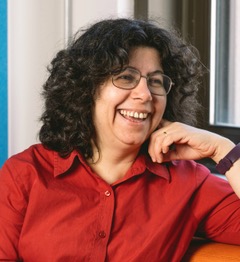Research Spotlight: AI Research in Canada

Artificial Intelligence (AI) has been featured in popular culture for decades. From the giant robots who kidnapped Lois Lane and were taken down by Superman in the 1941 animated film The Mechanical Monsters, to HAL 9000, the AI antagonist in 2001: A Space Odyssey to the currently ubiquitous AI portrait generators, artificial intelligence has been portrayed as a promise, a threat and a cool tool.
At Profound Impact, our newly-launched Research Impact product uses AI and data analytic tools to automatically match research collaborators with multiple online sources for funding opportunities and with potential industry partners to create competitive grant applications.
But what is AI and what role do Canada’s researchers play in advancing the field?
Canada’s Advisory Council on Artificial Intelligence states that AI represents a set of complex and powerful technologies that will touch or transform every sector of industry and that has the power to address challenging problems while introducing new sources of sustainable economic growth.
In 2017, in partnership with the Canadian Institute for Advanced Research (CIFAR), Canada launched the Pan-Canadian Artificial Intelligence Strategy. The country’s national AI strategy, the first in the world, has a stated vision that “by 2030 Canada will have one of the most robust national AI ecosystems in the world, founded upon scientific excellence, high-quality training, deep talent pools, public-private collaboration and our strong values of advancing AI technologies to bring positive social, economic and environmental benefits for people and the planet.”
AI research in Canada is currently centred in three national AI institutes: the Alberta Machine Intelligence Institute (Amii) in Edmonton, the Vector Institute in Toronto and Mila in Montreal. These not-for-profit organizations work in partnership with research universities and companies conducting AI research and development across Canada.
Four key strategic priorities have been identified as part of the Pan-Canadian Artificial Intelligence Strategy:
Advancing AI Science
Fundamental and applied research in areas including machine learning, natural language processing, autonomous vehicles, games and game theory and human-AI interaction.
AI for Health
AI-based approaches to health and healthcare that leverage Canada’s strength in health research and publicly-funded healthcare systems.
AI for Energy and the Environment
Innovative solutions to protect the environment and deal with the effects of climate change.
AI Commercialization
Funding and incentives for Canadian companies to develop AI technology and products.
The three hubs of AI excellence in the Pan-Canadian AI are recognized internationally for their research expertise and results, training of the next generation of AI researchers and practitioners and the transfer of scientific knowledge to industry.
Alberta-based Amii’s team includes 28 Fellows (including 23 Canada CIFAR AI Chairs) and eight Canada CIFAR AI chairs at universities across Western Canada. Amii researchers are pioneers and leaders in fields including Reinforcement Learning, Precision Health, Games and Game Theory, Natural Language Processing, Deep Learning and Robotics and work with a range of companies to translate research results to innovative products across industry sectors.
The Vector Institute was launched in March 2017 in partnership with the University of Toronto, the University of Guelph and the University of Waterloo to work with research institutions, industry, and incubators and accelerators across Canada to advance AI research and drive its application, adoption and commercialization.
Three key pillars in the Vector Institute’s three-year strategy are research, industry partnerships and thought leadership. Currently, the Vector Institute comprises more than 600 active researchers and professionals from across the country. More than 40 industry sponsors, representing a broad range of industries including health care, finance, advanced manufacturing, telecommunications, retail and transportation, collaborate with Vector Institute researchers on projects related to opportunities in AI.
The fourth pillar in the institute’s strategy and a focus of research is health, including responsible health data access for research, the use of machine learning tools, methods to analyze de-identified health data, and the creation of a secure data platform for applied AI research. Vector programs, including the Smart Health initiative and the support of Pathfinder Projects, facilitate the use of AI-assisted technologies in the health sector and the deployment of machine learning tools in hospitals across Ontario.
Mila was found in 19983 by Professor Yoshua Bengio of the Université de Montréal as a research lab to bring together researchers with a shared vision for the ethical development and advancement of AI. In 2017, the scope of Mila was expanded through collaboration between the Université de Montréal and McGill University and work with academic institutions Polytechnique Montréal and HEC Montréal.
Now a non-profit research institute, Mila also works with Quebec universities including Université Laval, Université de Sherbrooke and École de technologie supérieure. More than 1,000 researchers, including 51 CIFAR AI chairs, with expertise in machine learning theory and optimization, deep learning, computer vision and robotics, reinforcement learning, computational neuroscience and natural language processing.
In addition to conducting leading-edge research, Mila also works closely with 87 industry partners via collaborative research and technology transfer to facilitate the use of AI in company processes and product development. And the Mila Entrepreneurship Lab fosters student entrepreneurship from ideas to business projects through mentorship and funding. Eighteen Mila start-ups operate in Montreal, Toronto, New York City, Addis Ababa and Germany, working on the use of AI in medicine, finance, neuroscience and transportation.
Canada continues to fund emerging AI research institutes including the Centre for Innovation in Artificial Intelligence Technologies (CIAIT) at Seneca College of Applied Arts and Technology in Toronto and the Durham College Hub for Applied Research in Artificial Intelligence for Business Solutions (the AI Hub) in Oshawa, Ontario. At CIAIT, Seneca researchers will collaborate with industry partners to find AI solutions in sectors ranging from advanced manufacturing and commerce to creative media and finance. The AI Hub provides industry partners with access to AI expertise, state-of-the-art facilities and student talent to integrate AI solutions into products and business operations.
Canada’s strengths and global leadership in AI are powered by the investments made by the Government of Canada in AI research at institutions across the country. These investments are developing the adoption of artificial intelligence across Canada’s economy, connecting researchers and the next generation of AI professionals with industry partners to facilitate commercialization and advancing the development and adoption of AI standards to be used in Canada and around the world.
Researcher Spotlight: Doina Precup

Growing up in Romania, Doina Precup enjoyed science fiction featuring benign and helpful robots. That interest, plus the influence of her mother (a computer science professor), and the other women in her family with successful careers in science, were early draws for Professor Precup to the field of artificial intelligence.
Doina Precup is an associate professor at McGill University and head of the Montreal office of Deepmind. In addition to teaching at McGill, she is a core academic member at Mila, a Canada CIFAR AI Chair, a Fellow of the Royal Society of Canada, a Fellow of the CIFAR Learning in Machines and Brains program and a senior member of the Association for the Advancement of Artificial Intelligence.
Dr. Precup conducts fundamental research on reinforcement learning with a focus on AI applications in areas, such as health care, that have a social impact. At Deepmind, a subsidiary of Google, she leads a team of scientists, engineers and ethicists dedicated to using AI to advance science and solve real-world problems.
Dr. Precup’s focus on creating social impact goes beyond her work in the research laboratory. To address the issue of gender imbalance in science and technology, she co-founded and serves as advisor of the CIFAR-OSMO AI4Good Lab, an organization that encourages women to study and work in artificial intelligence via a seven-week AI training program for undergraduate and graduate students who identify as women. Dr. Precup was also one of four renowned Canadian AI researchers who signed a letter sent in 2017 to Canadian Prime Minister Justin Trudeau, asking that Canada announce its support for the call to ban lethal autonomous weapons systems at the United Nations Conference on the Convention on Certain Conventional Weapons (CCW).
Her work as an award-winning AI researcher dedicated to solving problems to benefit humanity, her leadership in building a diverse and inclusive culture in AI and her support and mentorship of emerging talent have established Doina Precup as a respected and distinguished member of the AI research community in Quebec, Canada and internationally.
